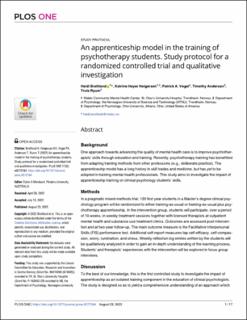| dc.contributor.author | Brattland, Heidi | |
| dc.contributor.author | Holgersen, Katrine Høyer | |
| dc.contributor.author | Vogel, Patrick A. | |
| dc.contributor.author | Anderson, Timothy | |
| dc.contributor.author | Ryum, Truls | |
| dc.date.accessioned | 2023-03-01T07:50:28Z | |
| dc.date.available | 2023-03-01T07:50:28Z | |
| dc.date.created | 2022-09-09T14:12:17Z | |
| dc.date.issued | 2022 | |
| dc.identifier.issn | 1932-6203 | |
| dc.identifier.uri | https://hdl.handle.net/11250/3054824 | |
| dc.description.abstract | Background One approach towards advancing the quality of mental health care is to improve psychotherapists’ skills through education and training. Recently, psychotherapy training has benefitted from adapting training methods from other professions (e.g., deliberate practice). The apprenticeship model has a long history in skill trades and medicine, but has yet to be adopted in training mental health professionals. This study aims to investigate the impact of apprenticeship training on clinical psychology students’ skills. Methods In a pragmatic mixed-methods trial, 120 first year students in a Master’s degree clinical psychology program will be randomized to either training-as-usual or training-as-usual plus psychotherapy apprenticeship. In the intervention group, students will participate, over a period of 10 weeks, in weekly treatment sessions together with licensed therapists at outpatient mental health and substance use treatment clinics. Outcomes are assessed post-intervention and at two-year follow-up. The main outcome measure is the Facilitative Interpersonal Skills (FIS) performance test. Additional self-report measures tap self-efficacy, self-compassion, worry, rumination, and stress. Weekly reflection log entries written by the students will be qualitatively analyzed in order to gain an in-depth understanding of the learning process. Students’ and therapists’ experiences with the intervention will be explored in focus group interviews. Discussion To the best of our knowledge, this is the first controlled study to investigate the impact of apprenticeship as an isolated training component in the education of clinical psychologists. The study is designed so as to yield a comprehensive understanding of an approach which could prove to be a valuable supplement to the existing educational methods in this field and ultimately, contribute to improve the quality of mental health care. | en_US |
| dc.description.abstract | An apprenticeship model in the training of psychotherapy students. Study protocol for a randomized controlled trial and qualitative investigation | en_US |
| dc.language.iso | eng | en_US |
| dc.rights | Navngivelse 4.0 Internasjonal | * |
| dc.rights.uri | http://creativecommons.org/licenses/by/4.0/deed.no | * |
| dc.title | An apprenticeship model in the training of psychotherapy students. Study protocol for a randomized controlled trial and qualitative investigation | en_US |
| dc.title.alternative | An apprenticeship model in the training of psychotherapy students. Study protocol for a randomized controlled trial and qualitative investigation | en_US |
| dc.type | Journal article | en_US |
| dc.type | Peer reviewed | en_US |
| dc.description.version | publishedVersion | en_US |
| dc.source.volume | 17 | en_US |
| dc.source.journal | PLOS ONE | en_US |
| dc.source.issue | 8 | en_US |
| dc.identifier.doi | 10.1371/journal.pone.0272164 | |
| dc.identifier.cristin | 2050343 | |
| cristin.ispublished | true | |
| cristin.fulltext | original | |
| cristin.qualitycode | 1 | |

